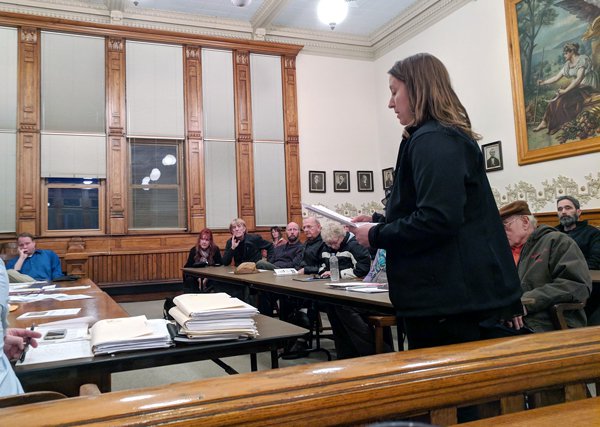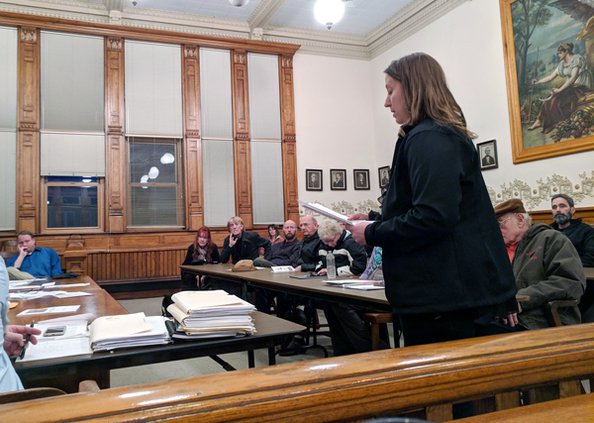MONROE — A line stretched from the podium out the door of the board room of the Green County Courthouse as nearly two dozen people signed in for a chance to speak during the county Land Use & Zoning Committee meeting Monday.
The topic on the meeting agenda which drew 47 members of the public was the drafting of an ordinance for incoming wind turbine systems. A majority of those who spoke were residents of Jefferson Township and neighboring areas who would be impacted by a planned development within the township.
Kelly Folk, who resides along Town Center Road near County K, said since she heard of the Sugar River Wind Project in November she has been going “door to door” with her four young children riding along in the minivan as she spends 10 hours or more on each trip talking to people to share information on the project.
“If this was put to a vote, this would never pass,” Folk said. “Study after study after study is linked to all kinds of negative effects: sleep disturbances, cardiovascular problems, headaches, pressure in the chest, feeling nauseous and anxiety. … It’s well-known that you can disable people just by using sound they cannot hear.”
EDF Renewable Energy Inc., a company headquartered in France but which maintains regional offices throughout the United States, submitted a pre-application to Zoning Administrator Adam Wiegel in September. The company has not officially applied to develop the Sugar River Wind Project, most recently citing a need to finalize the sale of energy created by the farm first.
Company officials from Minneapolis held an open house on the proposed Sugar River Wind Project Oct. 2 within the township. Representatives explained that the 24 wind turbines would be put in place on farmland leased from local residents. Construction of the structures includes a 10-foot foundation. The cement spans roughly 60 feet in diameter, but the only above surface portion of the base will be a 16-foot ring. The turbines are over 500 feet once standing.
The committee was not discussing that specific project, but rather the measures it can take to regulate the siting of such wind farms.
Regardless, those concerned over the incoming Sugar River project were present to protest the allowance of such a farm. Those who spoke shared worries over a decrease in property values and a negative impact on health as well as disagreement with allowing a large company to develop on local land.
No one stood to speak in favor of the project or the possibility of other turbines being placed in the area. Some criticized state law, the Public Service Commission Chapter 128, which requires counties to adhere to state-based regulations rather than enact their own.
Cindy Blanc, a Jefferson resident, was one of a few who called for the county to challenge the regulations legally and possibly fight out the issue in court. She was also one of several who called for a moratorium, or temporary halt, of all progress on wind farms within the county.
Corporation Counsel Brian Bucholtz, who noted he has not been overseeing the ordinance draft but was in attendance for the meeting, indicated that due to the PSC 128 regulations, if the county were to not act on such an application within 90 days, any project would be automatically approved if it met legal requirements. Wiegel confirmed that the language in PSC 128 calls for action or automatic approval within 90 days. Bucholtz said that likely meant that a moratorium would be ineffective.
Jackie Klar, a Jefferson resident, also called for the county to challenge the state law through legal means. Julie Hale, a resident who rents land near where one of the turbines will be set in place, quoted information on how far ice can be thrown from blades and engineering experts who have published challenges to the setbacks outlined in the PSC 128 regulations. She also called for a legal challenge by the county, based on concerns of possible health impacts.
Committee members Barb Krattinger, Mark Gundlach, Paul Beach and Kristi Leonard heard the concerns. Leonard said the committee is meant to represent all county residents; those in favor of wind farms and those against them.
In initial presentations, EDF representatives indicated the financial benefit to the county would be $151,000 annually.
Jerry Daniels, a farmer in Spring Grove, had a different concern for the committee. He said crop dusters cannot approach any closer than a mile from the turbines. Daniels also said he spoke to individuals involved in the annual balloon rally, who indicated they would have to deviate from their plans in order to continue hosting the event.
Beach moved to rescind the drafted ordinance which had been previously recommended for consideration by the full Green County Board of Supervisors, which was agreed on by the other three members in attendance. Sherri Fiduccia was absent.
Wiegel said he would bring the ordinance draft back to committee for more consideration in January. If any changes are needed, it will require another public hearing and could likely take up to four months to reach the board once again, he said. Beach said the setbacks outlined in the ordinance, which reflect the state regulations, seemed inadequate based on practice in other regions and throughout the world.

